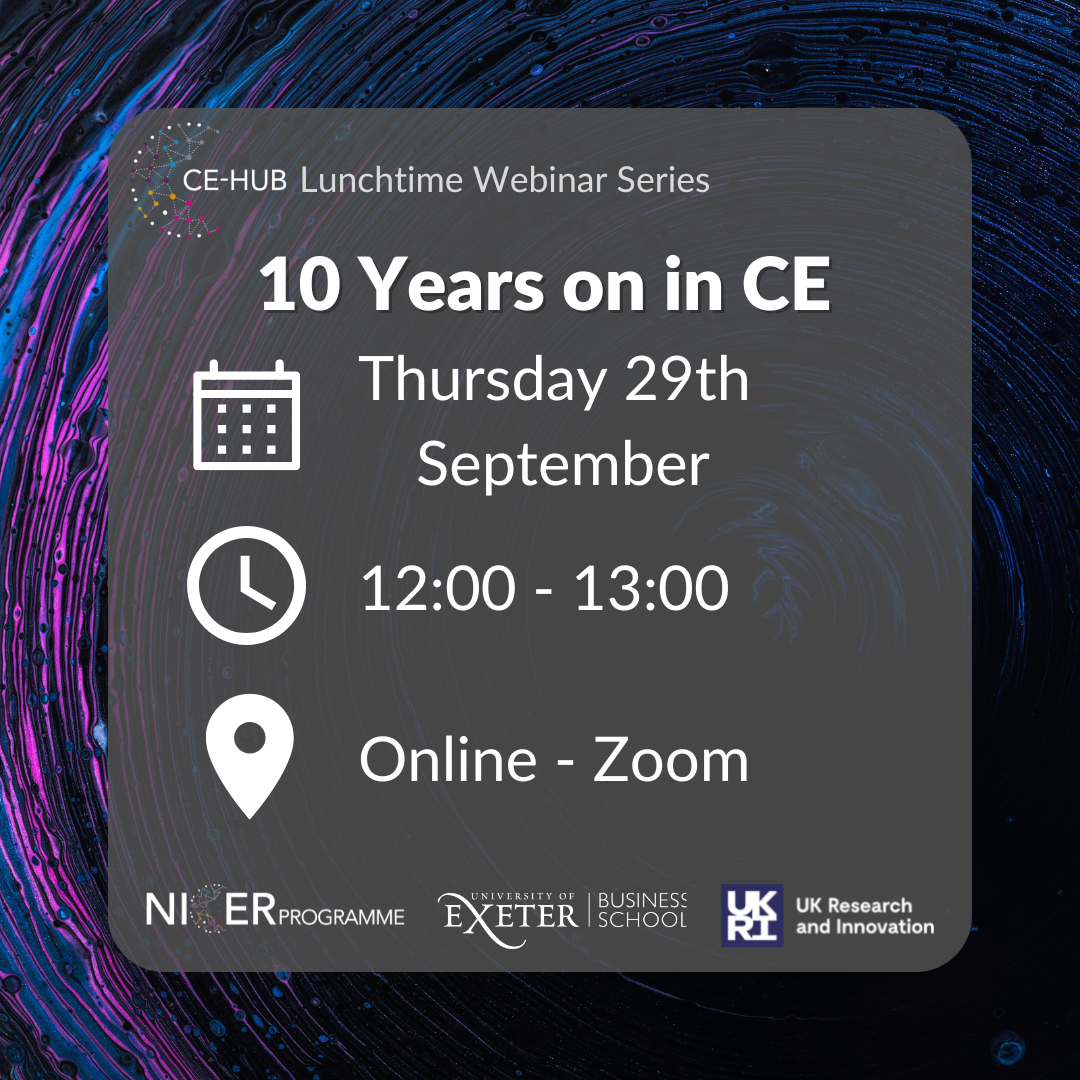10 Years on in CE – CE-Hub Lunchtime Webinar
A lot can change in 10 years and in this webinar we discuss progress in understanding and uptake of Circular Economy ideas over the past decade. Reflecting on progress and key learnings and on how current activities are shaping the way for the future.
Acknowledging that the idea of a Circular Economy has been around for much longer than a decade, Jamie Butterworth, Partner at Circularity Capital and founding CEO of the Ellen MacArthur Foundation, reflected that the publication of the Towards a Circular Economy Report in 2012 has led to a step-change in understanding and uptake of CE ideas among businesses, industry and investors. The collaborative report by Ellen MacArthur Foundation, McKinsey & Company and the World Economic Forum presented the idea of a Circular Economy as a business opportunity to consider the design of products and services. In recent years more and more people have heard of and understand what is meant by a Circular Economy while also seeing growing evidence that Circular Business Models can increase financial value of businesses but also improve social and environmental value.
Professor Julia Stegemann, director of the NICER Centre for Mineral-based Construction Materials at UCL discussed some examples of how research in the construction industry has changed over time. In 2012 there were just a handful of academic publications now there are thousands and it’s growing every day. She discusses two specific examples of circular research: developing a reusable flooring cassette and developing cross-laminated secondary timber. Both of these projects aim to enable material reuse at the same performance level. However there are challenges in logistics, investment and ensuring transparency and comprehensive data sharing while protecting business interests.
Moving from discussing products and materials with a long life-span to some of the shortest, Professor Steve Evans, co-investigator at the Textiles Circularity Centre, University of Cambridge reflected on the improved understanding of Circular Economy in the Textiles industry. However, he recognises that the next hurdle is improving and implementing the how of CE actions. At the Textiles Circularity Centre, their work focuses on small disruptors to disrupt large clothing supply, for example, focussing on bio-based textiles instead of polyester. He highlights three ‘watch words’ for the future: 1. Material Security, 2. Data and 3. Coordination.
The audience discussion expertly chaired by Amy Peace brought up issues such as public awareness of CE and the rise of dis- and mis-information, drivers for the uptake of CE amongst businesses, value assets and embedded carbon, challenges in technology to enable CE and ensuring key learning sof when things don’t work are recorded and shared.
You can watch a recording of the full webinar on youtube: https://youtu.be/4FGufdTQ8U0
Watch the Webinar RecordingMeet our Speakers
Session Chair: Amy Peace, Innovate UK
Based in the Manufacturing and Materials team, Amy’s role is focused on embedding Circular Economy and Life Cycle Analysis into Innovate UK strategy and programmes, and to ensure appropriate innovations can be developed and exploited by UK business in response to industrial challenges and commercial opportunities. A specific focus is on the role that the Circular Economy can play in the delivery of Net Zero CO2 targets.
Expert Panel:
Jamie Butterworth, Circularity Capital
Jamie is responsible for overseeing portfolio company growth through leveraging Circularity Capital’s specialist insight and network in the circular economy. He has spent over a decade supporting the growth and innovation of businesses in the circular economy. What drove Jamie to establish Circularity was the deeply held belief that circular businesses can grow faster with an investor who really understands their business model and has the right insight and network to scale. Prior to Circularity Jamie was the founding CEO of the Ellen MacArthur Foundation, a global hub for circular economy innovation.
Steve Evans, Textiles Circularity Centre, University of Cambridge
Professor Steve Evans joined academia in 1988 after 12 years in various industries. He leads the Centre for Industrial Sustainability at the Institute for Manufacturing, University of Cambridge and is Co-Investigator at the Textile Circularity Centre with RCA. He has led over £30m in grants including the UKs 1st grant studying how multi-disciplinary teams innovate, and the 1st grant in sustainable business models and what we now call Circular Economy (in 1995). Steve has founded various cleantech start-ups and has been Special Adviser to the House of Lords. Steve is particularly proud of his students who include two current female PVCs and the UKs first female BAME Head of a Business School. In 2019 Steve was elected to Membership of Academia Europaea.
Julia Stegemann, Interdisciplinary Circular Economy Centre for Mineral-based Construction Materials, UCL
Julia is a Professor of Environmental Engineering at UCL. She is particularly interested in development of sustainable technologies and systems that will enable return of industrial by-products and residual wastes to the resource loop. She is also interested in development of regulations, policy and other systems that affect the sustainability and efficient use of materials resources. Much of her work is in collaboration with industry, and she has experience in laboratory characterisation of materials, development of technologies and test methods, preparation of regulatory guidance documents, implementation and evaluation of technologies at field scale, and databases and computer modelling.
View our upcoming events



